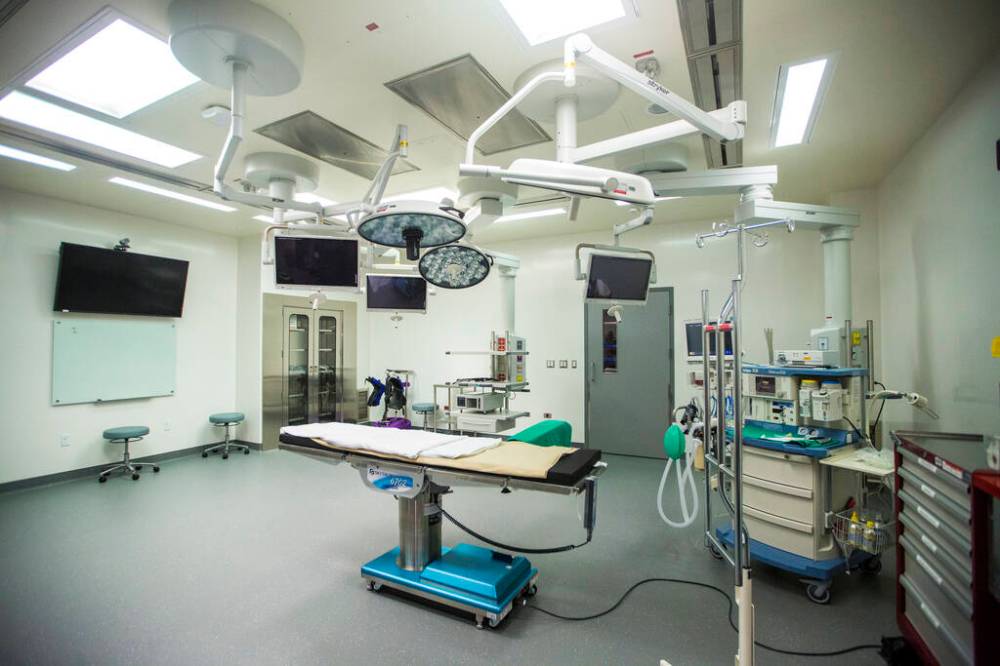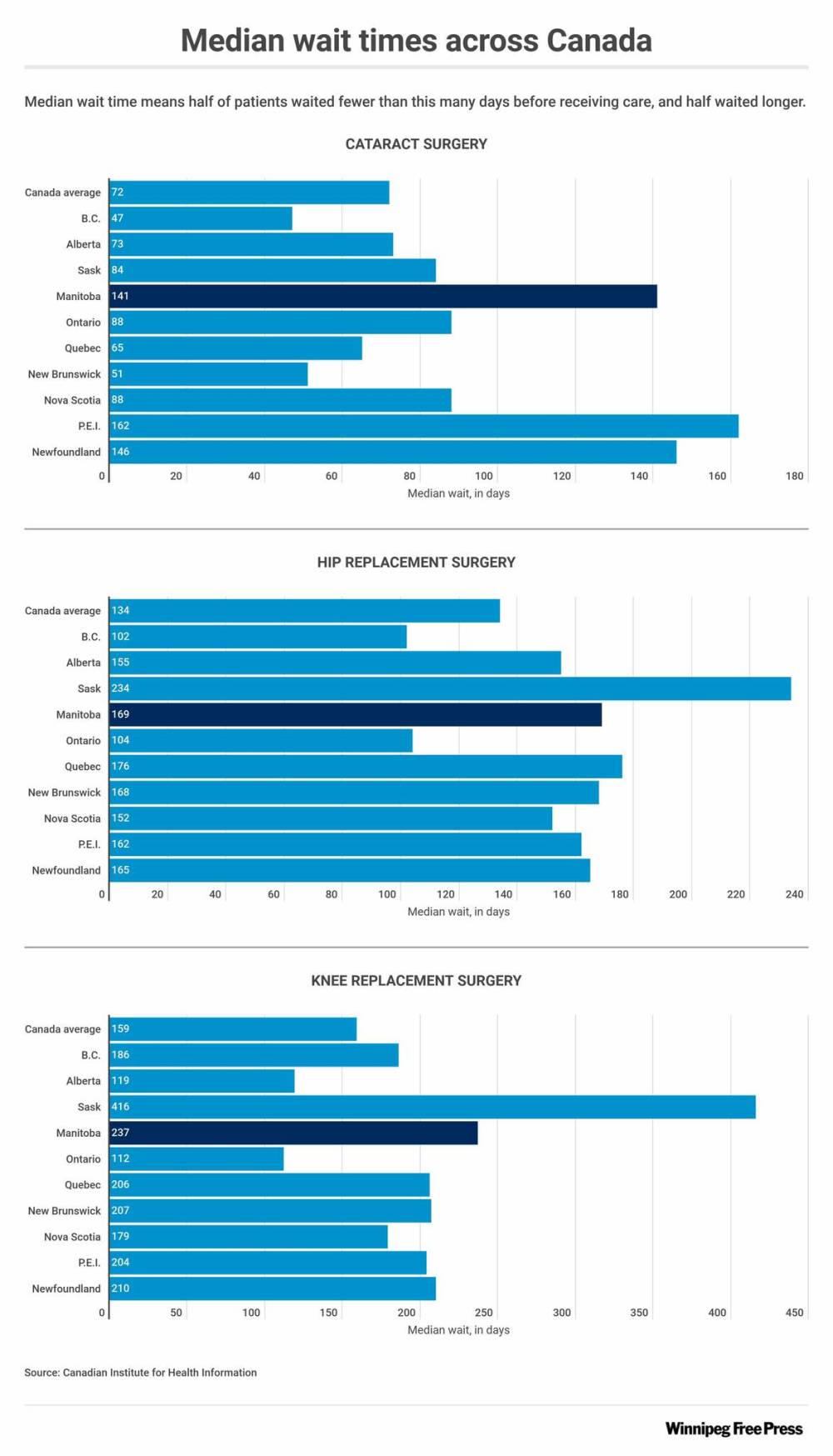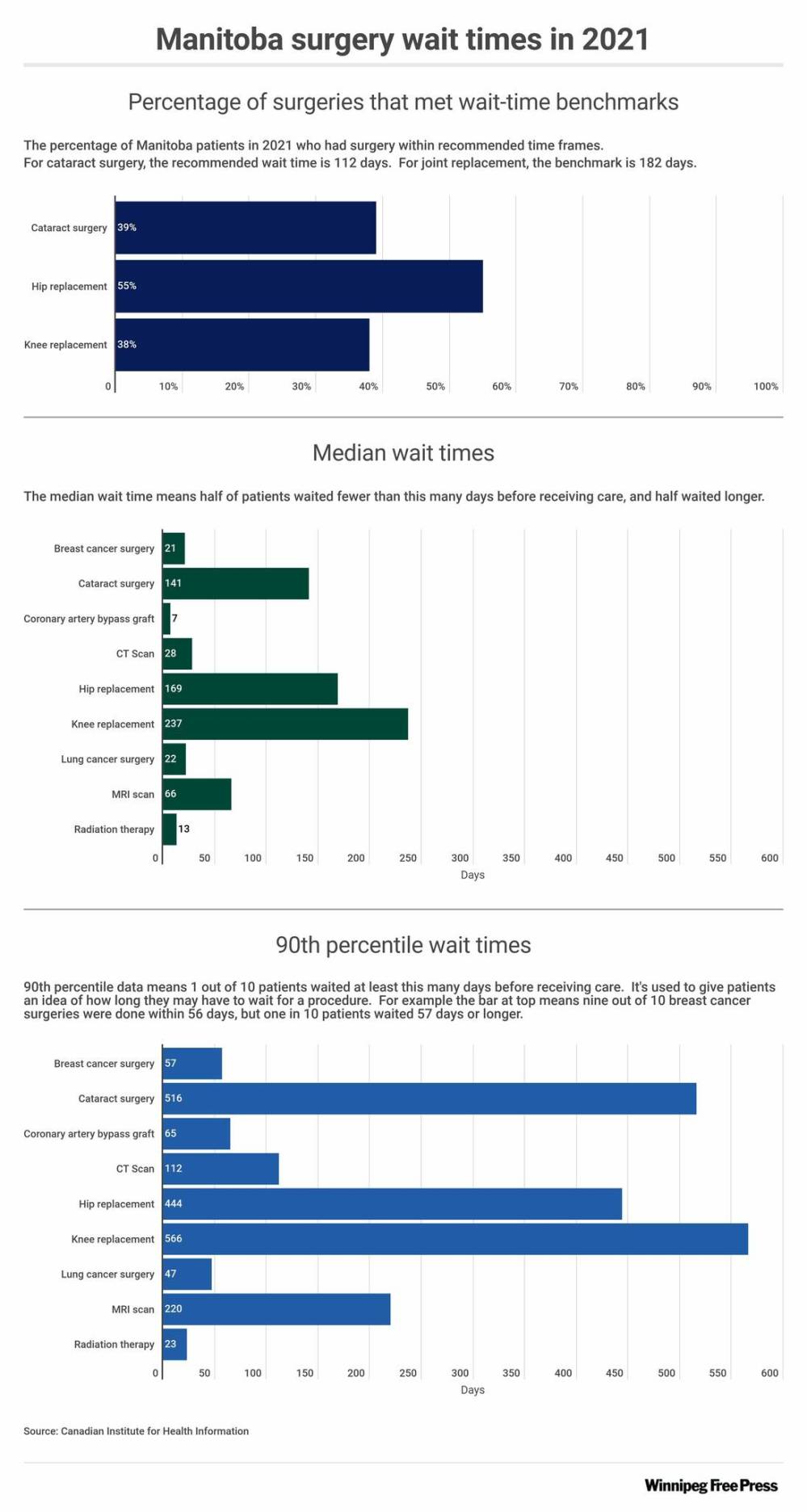Manitobans endured some of Canada’s longest waits for cataract, knee surgery during pandemic, study reveals
Advertisement
Read this article for free:
or
Already have an account? Log in here »
To continue reading, please subscribe:
Monthly Digital Subscription
$0 for the first 4 weeks*
- Enjoy unlimited reading on winnipegfreepress.com
- Read the E-Edition, our digital replica newspaper
- Access News Break, our award-winning app
- Play interactive puzzles
*No charge for 4 weeks then price increases to the regular rate of $19.00 plus GST every four weeks. Offer available to new and qualified returning subscribers only. Cancel any time.
Monthly Digital Subscription
$4.75/week*
- Enjoy unlimited reading on winnipegfreepress.com
- Read the E-Edition, our digital replica newspaper
- Access News Break, our award-winning app
- Play interactive puzzles
*Billed as $19 plus GST every four weeks. Cancel any time.
To continue reading, please subscribe:
Add Free Press access to your Brandon Sun subscription for only an additional
$1 for the first 4 weeks*
*Your next subscription payment will increase by $1.00 and you will be charged $16.99 plus GST for four weeks. After four weeks, your payment will increase to $23.99 plus GST every four weeks.
Read unlimited articles for free today:
or
Already have an account? Log in here »
Hey there, time traveller!
This article was published 10/05/2022 (1311 days ago), so information in it may no longer be current.
Manitobans in need of cataract and knee-replacement surgery languished on wait-lists longer than residents of almost every other province during the first 18 months of the COVID-19 pandemic.
On Tuesday, the Canadian Institute for Health Information released national wait-time data for a suite of surgical and diagnostic procedures performed between April 2020 and September 2021.
While wait times improved in most provinces during the period, Manitobans had lengthy waits for priority procedures, including hip and knee replacements, critical diagnostic tests and cataract surgery.
“That’s not something to be proud of,” ophthalmologist and surgeon Dr. Jennifer Rahman said. “We need to do better.”
Just 39 per cent of people waiting for cataract surgery in the province were seen within the medically recommended benchmark time of 16 weeks, or 112 days, the study revealed.
It was the second-longest wait in the country after Prince Edward Island, and nearly twice the national average. The median wait for cataract surgery was 141 days. The 90th percentile — the longest wait for nine out of 10 patients — was 516 days.

“We’re hopeful that this will shine even more light on the urgency of the matter,” said Rahman, president of the Eye Physicians and Surgeons of Manitoba.
Rahman said her operating room had lengthy service disruptions during pandemic waves as staff were redeployed to care for COVID-19 patients, with the latest surgical slate reduction lasting nearly five months.
Compared to other provinces — including Saskatchewan, Alberta and Ontario, which were able to deliver cataract surgery within benchmark waits more than 60 per cent of the time — Manitoba entered the pandemic vulnerable to surgical disruptions, said physicians’ advocacy group Doctors Manitoba.
Lengthy waits for cataract surgery could also be attributed to Manitoba having fewer ophthalmologists per capita compared with other provinces, Rahman said.
The province should remove a cap on the number of cataract surgeries performed annually at the Misericordia Health Centre and provide additional funding to allow staff at the hospital to “get the job done,” she said.
Rahman estimates the pandemic backlog to include more than 9,300 cataract cases while the Misericordia treats that many cataract patients annually.
“It’s going to be a very uphill battle to get to a decent spot on the national scale,” she said.
CIHI reported Tuesday that knee-replacement waits averaged 237 days in Manitoba, the second-longest in the country after Saskatchewan.
The national average was 159 while the benchmark is 182 days. Only 38 per cent of knee-replacement surgeries in Manitoba occurred within that time frame.
For hip replacements, 55 per cent of Manitoba patients received surgery within the 26-week benchmark, the fourth-longest wait in Canada.
Doctors Manitoba said wait times for priority procedures started increasing in 2014 and were on a “concerning” upward trend in 2019, prior to the pandemic, based on the CIHI data.
“While we already knew wait times increased during the pandemic, this new national report reveals that Manitoba has among the longest wait times in the country for many surgical and diagnostic procedures,” association president Dr. Kristjan Thompson said in a statement.
The group has been lobbying the province to tackle the backlog of procedures and tests — which is estimated to include nearly 170,000 cases — and to provide monthly reporting on progress and commit to a date to eliminate the backlog.
Health Minister Audrey Gordon wouldn’t answer questions about the CIHI report.
In question period, she said her government is focused on reducing the backlog. She highlighted the $110 million set aside in the budget for diagnostic and surgical recovery task force initiatives.
Meanwhile, patients are becoming increasingly frustrated by delays for surgery, NDP Leader Wab Kinew said.
“This data just helps to reinforce how serious this problem is,” Kinew said. “It’s clear that we need investment in the public health system so we can get more nurses working in the operating rooms and recovery rooms here in Manitoba.”
The province’s attempts to reduce surgical wait-times is “nowhere near good enough,” Liberal Leader Dougald Lamont said. He raised concern the province’s efforts will only bring wait times to 2019 levels, which were trending in the wrong direction.
“They are basically setting the bar low so that they can declare victory without actually addressing the problem in any significant or serious ways,” Lamont said.
danielle.dasilva@freepress.mb.ca

Our newsroom depends on a growing audience of readers to power our journalism. If you are not a paid reader, please consider becoming a subscriber.
Our newsroom depends on its audience of readers to power our journalism. Thank you for your support.




